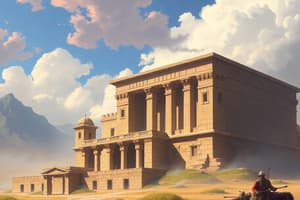Podcast
Questions and Answers
History is the study of past events, particularly in human affairs.
History is the study of past events, particularly in human affairs.
True (A)
Economic history focuses solely on military events.
Economic history focuses solely on military events.
False (B)
Primary sources are original documents or artifacts from the time period being studied.
Primary sources are original documents or artifacts from the time period being studied.
True (A)
Cultural history investigates military strategies and warfare.
Cultural history investigates military strategies and warfare.
The Middle Ages is characterized by the spread of Christianity and Islam.
The Middle Ages is characterized by the spread of Christianity and Islam.
Tertiary sources are original documents or artifacts from history.
Tertiary sources are original documents or artifacts from history.
Change and continuity is a key historical theme that examines what changes over time.
Change and continuity is a key historical theme that examines what changes over time.
Chronology refers to understanding events within their broader social and cultural contexts.
Chronology refers to understanding events within their broader social and cultural contexts.
Flashcards are hidden until you start studying
Study Notes
Key Concepts in History
-
Definition of History
- Study of past events, particularly in human affairs.
- Involves analysis of sources, interpretation of data, and understanding context.
-
Branches of History
- Political History: Focuses on government, political movements, and power dynamics.
- Social History: Explores the lives of ordinary people and social structures.
- Economic History: Examines economic systems, trade, and financial institutions.
- Cultural History: Investigates cultural practices, arts, and intellectual movements.
- Military History: Analyzes warfare, battles, and military strategies.
-
Historical Sources
- Primary Sources: Original documents or artifacts from the time period being studied (e.g., diaries, letters, photographs).
- Secondary Sources: Interpretations or analyses of primary sources (e.g., textbooks, articles).
- Tertiary Sources: Compilations of information from primary and secondary sources (e.g., encyclopedias).
-
Historical Methodology
- Chronology: Establishing a timeline of events.
- Comparison: Analyzing similarities and differences between events or societies.
- Contextualization: Understanding events within their broader social, political, and economic contexts.
- Critical Analysis: Evaluating sources for credibility, bias, and perspective.
-
Major Eras in History
- Prehistoric Era: Time before written records, relying on archaeology.
- Ancient Civilizations: Emergence of writing, cities, and complex societies (e.g., Mesopotamia, Egypt, Indus Valley).
- Classical Antiquity: Rise of empires (e.g., Roman Empire, Greek City-States) and philosophical advancements.
- Middle Ages: Feudalism, the spread of Christianity and Islam, and societal transformations in Europe and Asia.
- Renaissance: Cultural revival in Europe, advancements in art, science, and humanism.
- Modern Era: Industrial Revolution, colonization, world wars, and the rise of contemporary global issues.
-
Key Historical Themes
- Change and Continuity: Understanding what changes over time and what remains the same.
- Conflict and Cooperation: Examining how and why societies clash or collaborate.
- Influence of Geography: How physical landscapes shape human activity and historical outcomes.
- Identity and Society: Exploration of how individual and collective identities are formed and transformed.
-
Importance of History
- Provides insight into current events and societal issues.
- Helps understand cultural heritage and human behavior.
- Aids in developing critical thinking and analytical skills.
Definition of History
- Study of past human events, encompassing analysis of sources and interpretation of data within context.
Branches of History
- Political History: Examines government systems, political movements, and power dynamics.
- Social History: Focuses on the lives of ordinary individuals and societal structures.
- Economic History: Investigates economic systems, trade practices, and financial institutions.
- Cultural History: Explores cultural practices, arts, and intellectual developments.
- Military History: Analyzes warfare, significant battles, and military tactics.
Historical Sources
- Primary Sources: Authentic documents or artifacts from the specific time period, such as diaries and photographs.
- Secondary Sources: Interpretive works that analyze and discuss primary sources, e.g., textbooks and scholarly articles.
- Tertiary Sources: Compilations that provide summaries of information from primary and secondary sources, like encyclopedias.
Historical Methodology
- Chronology: Establishes timelines of historical events, aiding in understanding sequences and causations.
- Comparison: Evaluates similarities and disparities between historical events or societies for deeper insights.
- Contextualization: Places events within broader social, political, and economic frameworks.
- Critical Analysis: Assesses sources for credibility, potential biases, and varying perspectives.
Major Eras in History
- Prehistoric Era: Represents a time before written documentation, studied primarily through archaeological evidence.
- Ancient Civilizations: Marks the development of writing and complex societies, seen in regions like Mesopotamia and Egypt.
- Classical Antiquity: Features the rise of civilizations and empires, including the Roman Empire and Greek City-States, marked by philosophical growth.
- Middle Ages: Characterized by feudalism, along with the spread of major religions such as Christianity and Islam across Europe and Asia.
- Renaissance: Signifies a cultural revival in Europe, with key advancements in the arts, sciences, and humanist thought.
- Modern Era: Encompasses events like the Industrial Revolution, colonization, world wars, and the emergence of contemporary global challenges.
Key Historical Themes
- Change and Continuity: Focuses on transitions across time alongside enduring elements in societies.
- Conflict and Cooperation: Analyzes reasons for societal clashes and collaborations throughout history.
- Influence of Geography: Examines the impact of physical landscapes on human activities and historical evolution.
- Identity and Society: Investigates the formation and transformation of individual and collective identities.
Importance of History
- Provides context that enriches understanding of contemporary events and societal challenges.
- Enhances appreciation of cultural heritage and human behavior across eras.
- Develops critical thinking and analytical skills essential for informed engagement with the world.
Studying That Suits You
Use AI to generate personalized quizzes and flashcards to suit your learning preferences.




